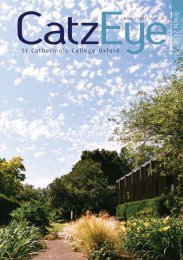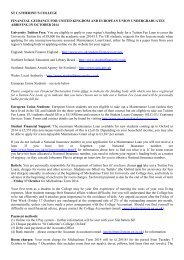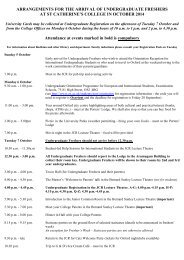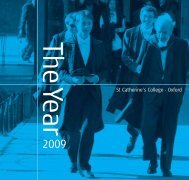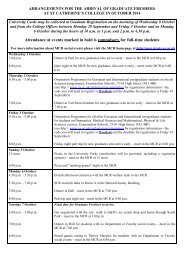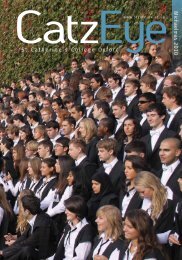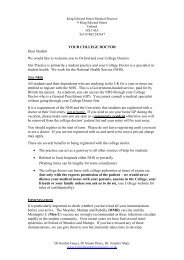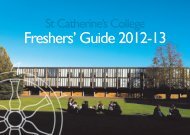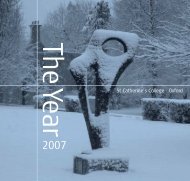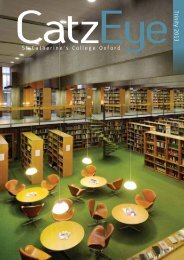Download PDF - St. Catherine's College - University of Oxford
Download PDF - St. Catherine's College - University of Oxford
Download PDF - St. Catherine's College - University of Oxford
Create successful ePaper yourself
Turn your PDF publications into a flip-book with our unique Google optimized e-Paper software.
STUDENT PERSPECTIVES<br />
MESSAGES<br />
I wanted to<br />
see if I could<br />
understand the<br />
experience <strong>of</strong> a<br />
conflict I could<br />
never share<br />
The memorial to <strong>St</strong> Francis<br />
Xavier in Nagasaki – the<br />
characters translate as<br />
(heaven)<br />
Thom Mallon<br />
(2009, English), winner <strong>of</strong> the 2011<br />
Wallace Watson Award, writes about his<br />
experiences following footsteps <strong>of</strong> his<br />
POW grandfather across Asia.<br />
In the summer <strong>of</strong> 2011, I trekked solo through three<br />
locations: southern Laos, Korea, and the area in and<br />
around Nagasaki, Japan. The link between them was<br />
American military activity in backwards-chronological<br />
order, but the idea was born from the Vietnam War,<br />
in which my grandfather participated. Having heard<br />
stories about the Vietcong’s supply chains, and the<br />
American efforts to undo and destroy the network <strong>of</strong><br />
paths and tunnels they used to move supplies from the<br />
north to the south – known collectively as the Ho Chi<br />
Minh Trail – I wanted to see if I could bridge the gap, in<br />
some small way, between my own experience and the<br />
experience <strong>of</strong> someone who walked that trail in earnest.<br />
In other words I wanted to see if I could understand the<br />
experience <strong>of</strong> a conflict I could never share.<br />
To be clear, there is no way to understand what it is<br />
like to participate in a war, in that way. Not for us any<br />
more, not in the days <strong>of</strong> drone strikes. This was fighting<br />
against an enemy that was vastly superior in terms <strong>of</strong><br />
military strength and resources. The fear and terror<br />
that must come with such a commitment is terribly hard<br />
to imagine. I had my own brushes with fear – actual,<br />
Sharing breakfast with Vietnamese truckers.<br />
physical fear – during the trek, and this served mostly<br />
to help me understand how extreme the fear felt in<br />
war must be relative to my own. In the jungle, at night,<br />
it is very, very dark. Animals live there. You can hear<br />
them. There’s no one around to help you. Sometimes<br />
it’s eerily quiet, and sometimes you can hear snakes<br />
hissing. Needless to say, it was very difficult to sleep<br />
in such a place, so I ended up walking every night until<br />
the sun rose, until I was exhausted to the point that my<br />
own anxiety could no longer suppress the hormones<br />
telling my brain to shut down. I felt that afraid, and<br />
there wasn’t even anyone in particular trying to kill<br />
me. But if I couldn’t understand the experience <strong>of</strong> a<br />
Viet Cong, at least I understood a little better why I<br />
couldn’t. And I was able to understand other things –<br />
the communist guards who I had to bribe coming into<br />
Laos, and the communist guard who treated me to<br />
lunch on the way out. The Vietnamese truckers who<br />
invited me to have breakfast with them on the side <strong>of</strong><br />
32/THOM MALLON<br />
ST CATHERINE’S COLLEGE 2012/32



